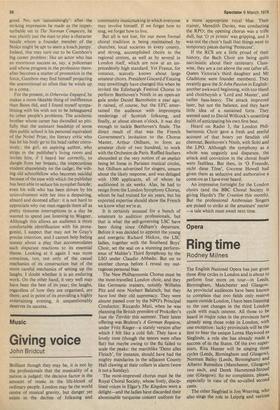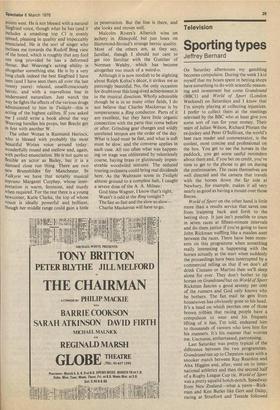Opera
Ring time
Rodney Milnes The English National Opera has just given three Ring cycles in London and is about to perform four more on tour—in Leeds, Birmingham, Manchester and Glasgow. As provincial audiences have been known to complain that ENO fields only reserve teams outside London, I have been listening to the cast changes in the third London cycle with much interest. All those to be heard in major roles in the provinces have already sung those roles in London, with one exception: lucky provincials will be the first to hear the unique Lorna Haywood as Sieglinde, a role she has already made a success of in the States. Of the ENO superstars, Rita Hunter will be singing three cycles (Leeds, Birmingham and Glasgow), Norman Bailey (Leeds, Birmingham) and Alberto Remedios (Manchester, Glasgow) two each, and Derek Hammond-Stroud one (Glasgow). So no complaints, please, especially in view of the so-called second casts.
The other Siegfried is Jon Weaving, who also sings the role in Leipzig and various
Points west. He is not blessed with a natural Siegfried voice, though what he has (and it Includes a smashing top C) is evenly Spread, pleasing in quality and impeccably enunciated. He is the sort of singer who Inclines me towards the Rudolf Bing view of the breed, which is roughly that any fool can sing provided he has a deformed throat. But Weaving's acting ability is altogether something else. He is by a very long chalk indeed the best Siegfried I have seen (and I have seen them all over the last twenty years): relaxed, unselfconsciously heroic, and with a marvellous line in understated naturalism. Just watch the Way he fights the effects of the various drugs administered to him in Twilight—this is acting of the highest calibre. If you asked Me I could write a book about the way Weaving handles his props, but Brecht got In first with another W.
The other Wotan is Raimund Herincx, Who is blessed with probably the most beautiful Wotan voice around today: wonderfully round and mellow and, again, With perfect enunciation. He is not quite so flexible an actor as Bailey, but it is a damned close run thing. There are two new Brunnhildes for Manchester. In Valkyrie we have that notably musical soprano Margaret Curphey, whose interpretation is warm, feminine, and sturdy When required. For the rest there is a young newcomer, Katie Clarke, the top of whose vouce is ideally powerful and brilliant, though her middle range could gain a little
in penetration. But the line is there, and she looks and moves well.
Malcolm Rivers's Alberich wins on lechery in Rhinegold, but just loses on Hammond-Stroud's strange heroic quality. Most of the others are, as they say, familiar, though I should not care to get too familiar with the Gunther of Norman Welsby, which has become altogether too much of a weird-o.
Although it is now modish to be slighting about Ralph Koltai's decor, it strikes me as piercingly beautiful. No, the only occasion for doubt over this long-tived achievement is in the musical direction. Wholly admirable though he is in so many other fields, I do not believe that Charles Mackerras is by temperament a Ring conductor. Parts of it are excellent, but they have little organic connection with the parts that come before or after. Grinding gear changes and wildly unrelated tempos are the order of the day. What is loud must be fast, and what is soft must be slow, and the converse applies in each case. All too often what was happening on stage was obliterated by relentlessly coarse, baying brass or glutinously impenetrable woodwind textures. The reduced touring orchestra could bring real dividends here. As the Waltraute scene in Twilight almost ground to a complete halt, I caught a severe dose of the A. A. Milnes: God bless Wagner, I know that's right, Wasn't it odd at the Ring tonight ?
The fast so fast and the slow so slow— Charlie Mackerras will have to go.



































 Previous page
Previous page